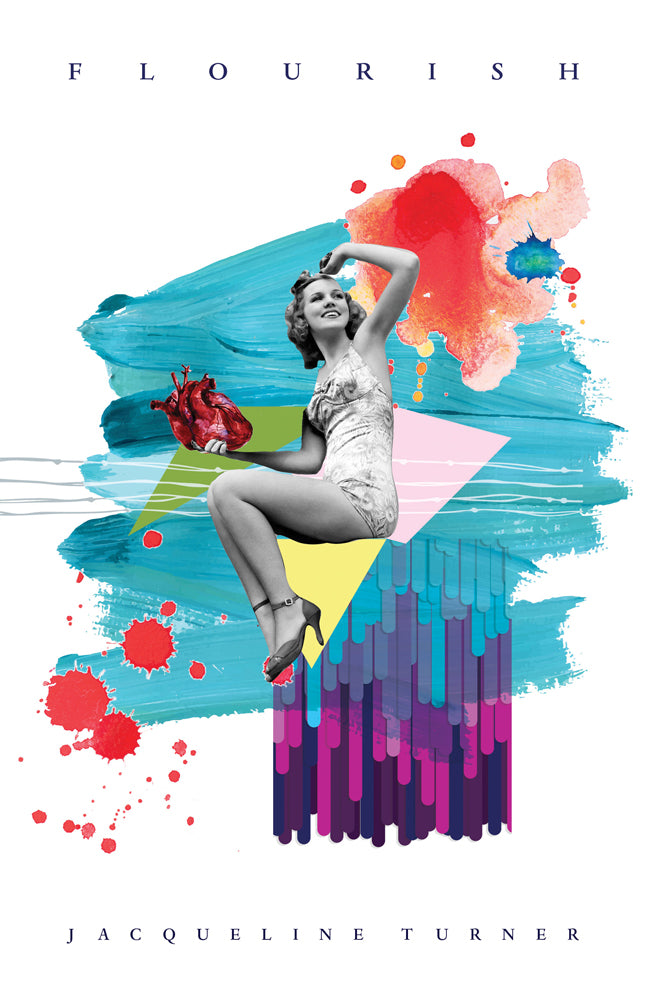
Flourish
$12.99-
“Smart, clear-eyed… Turner’s gift is for beautiful concision.” — Georgia Straight on The Ends of the Earth
Jacqueline Turner’s Flourish moves between philosophy, literary criticism, biography, and poetry. Both personal and experimental, her writing becomes transformative as it explores memories of growing up in a small town, parenting a set of adventurous sons, traveling, and reading. At times her poems act like micro essays, at other times they are miniature memoirs or precise manifestos, and throughout the collection’s exploration of contemporary cities and culture, a tense beauty emerges.
Turner takes readers to a park in Berlin set up like a messy living room, to a gallery in Granada where the view from a window beside a famous painting more perfectly frames an ancient stone wall, and to a karaoke room in Tokyo where comedic possibilities merge with spilled drinks. In the end, Flourish celebrates the abundance of words already read, while conveying gratitude for the ones still about to be read. A bold gesture, a green light, a way forward in challenging times.
BUY FROM:
Price may vary by retailer
Check availability at your local Canadian independent bookstore:
Remember that most stores can easily order books they don’t currently have in stock.
BUY FROM ECW PRESS:
Jacqueline Turner is the author of The Ends of the Earth (ECW Press 2013). She is a Lecturer at Emily Carr University of Art + Design and has held writing residencies in Brisbane, Tasmania, Granada, and Berlin. Her work is published widely in Canada and internationally. She lives in Vancouver, British Columbia.
-
Published: September 2019
ISBN: 9781770415065
Dimensions: 5.5 x 8.5 in.
Pages: 128
Reviews
“Written from the vantage of a writer in the middle of her life and career, Jacqueline Turner’s Flourish looks back — longingly yet complexly — on autobiographical events and instrumental texts that have shaped the politics and poetics of her current self. The brief episodes recounted in this body of work slowly accumulate and resonate, perhaps especially for women who grew up in Canada in the 1980s and ’90s. Flourish is a quiet tornado: riveting, expansive, and profoundly moving on multiple levels. Time buckles and reverses as Turner contemplates her father’s death, her children’s entries into adulthood, and her own emergence as an established writer. As a fellow girl who was not expected to become important, I shiver with recognition at Turner’s various ‘returns to the beginning at the end.’ Yet Flourish is not Turner’s end — not by far!” — Theresa Smalec, Associate Professor, Bronx Community College/City University of New York
“Reading Jacqueline Turner’s Flourish makes us want to write, to remember; also to sing, then read, then cry, and re-read. We’re reading it while thinking about reading, and remembering. What the book makes us want to do is re-think it all, and re-think remembering it all, and remember re-thinking it — and most of all — to keep reading this, to keep this reading. We know we’ll return to it again.” — Wayde Compton, author of The Outer Harbour, Performance Bond, 49th Parallel Psalm, and After Canaan: Essays on Race, Writing, and Region
“Turner’s work is an essential handbook of navigating our experience of time in COVID-tide, its moments of loss and denial. It reads our time well.” — The Typescript
“Jacqueline Turner’s Flourish is ‘meant to be simple.’ Isn’t it? It reads nostalgia. Here, a state of being, yearning for a time that might not have been particularly all that grand. What it wants back is not what it was. What was simple reflects without force. Such simplicity was all here too: the past and its residue, hesitant speech parts and its counterparts, trips and its trip-ups. A blueprint for what it looks like to think and feel everything at once: I’m dazzled by it.” — Danielle LaFrance, author of Friendly + Fire and Just Like I Like It
“[Turner’s] prose poems do come through in a rush; one that appears highly considered, each word and phrase weighed before set on the page, but with such an ease of flow akin to a sudden release of water.” — rob mclennan’s blog
